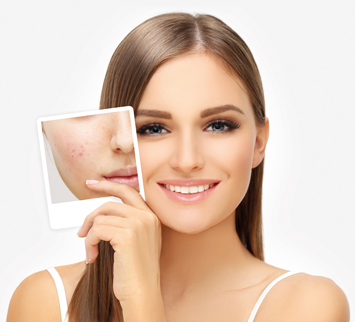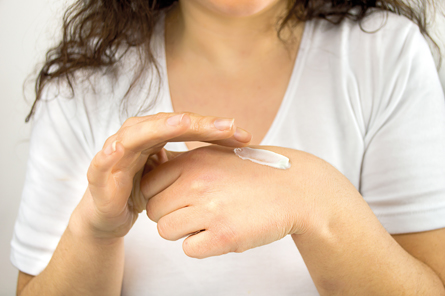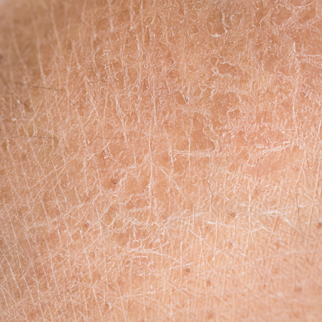OTC

More than skin deep
In OTC
Bookmark
Record learning outcomes
Depression and anxiety, in particular, are common comorbidities for patients with eczema and psoriasis
This article considers the psychological impact of dermatological conditions and the news about products for dry skin
Dry skin conditions are among the most common dermatological diseases in the UK. The symptoms range from occasional patches of slightly dry skin to severe widespread inflammation, itching and scaling. Whatever their severity, these chronic conditions can have a significant emotional impact and affect people’s day-to-day lives. Yet many patients are still not getting the support they need.
Support is available through self-help measures or by referral to a team psychologist or liaison psychiatry. But in July, experts from the Severe Eczema and Psoriasis Team at St. John’s Institute of Dermatology, at St Guy’s and St Thomas’ NHS Foundation Trust, warned that the need for psychological support amongst dermatology patients is not being met. This team recently won the first ever ‘BMJ Dermatology Team of the Year’, for their commitment to holistic care.
Many patients with a dry skin condition seem reluctant to seek help, especially
if their symptoms are mild. “I think the message is getting through quite slowly to people that not only is it okay to find the emotional side of dry skin conditions hard to handle, and that it is very common for these conditions to take an emotional toll, but that you can also talk to your doctor about it,†says Matthew Gass of the British Association of Dermatologists. “It’s also hard for people to process that the severity of the condition isn’t necessarily related to the severity of the psychological impact.â€
 Feel-good factor
Feel-good factor
Dry skin conditions can flare up at any time, but may be worsened by stress and anxiety. Exorex’s new campaign for psoriasis – ‘I Am Beautiful’ – aims to raise awareness of the condition and encourage sufferers to feel confident in their skin. Launched in June, the campaign focuses on the importance of lifestyle and feeling good on the inside in helping to manage psoriasis. From mindfulness and meditation, to relaxing hobbies like gardening, cooking and crafts, there is no single ‘right’ way – it’s all about finding what works for individuals and what makes them feel good about themselves.
“Depression and anxiety, in particular, are common comorbidities for patients with eczema and psoriasis,†says Mr Gass. “If patients are struggling with their mental wellbeing, they should be encouraged to speak to their doctor about it, or if they want to try self-help then they could visit Skin Support (www.skinsupport.org.uk), a Department of Health funded website. Information is key when it comes to managing dry skin conditions, and finding impartial and accurate advice in the internet age can be difficult, so signposting patients is important. The BAD’s patient information leaflets are available for a wide range of conditions and can be found online.â€
A survey conducted on behalf of Cetraben has found that the prominence of social media and photo sharing has increased self-consciousness among people with skin conditions, who worry what others will think of them. The survey showed that 24 per cent of people have been discouraged from posting photos of themselves on social media channels for fear of being judged, and just under a third actively avoid being in photographs when suffering with a skin flare-up.
Consultant psychodermatologist Dr Anthony Bewley says: “It’s well recognised that living with a skin condition can have a massive impact on an individual’s outlook on life, and small problem areas do not necessarily mean a small impact on day-to-day living. Even skin conditions
that are usually hidden under clothing can have an effect. Often, people can feel very alone and as though there are no effective options out there. However, there are usually very effective treatments for many skin conditions and appropriate support available.â€
 Pharmacy advice
Pharmacy advice
Patients may be bewildered by the wide array of emollients for dry skin. This means that compliance is often low and chronic conditions are not treated effectively. Independent pharmacists and their staff can help patients with dry skin to choose the product that is best for them and explain how to use it, improving compliance and overall patient health and wellbeing. If the person doesn’t like the ‘feel’ of the emollient then they are unlikely to regularly reapply it. In this case, a less greasy emollient that they reapply more regularly may be better.
Product choices can change over time, as customers age, and also with the changing seasons. LloydsPharmacy recently introduced free skin analysis testing in a number of branches to offer customers tailored skincare advice. A skin analysis machine measures elasticity, hydration, oil (sebum), pigmentation, pH and temperature, and tells customers whether their skin age is in line with their biological age. Skin health advisors can then recommend skincare products to suit customers’ individual needs, including advice for skin conditions such as eczema, psoriasis, acne and rosacea.
“We’ve found that a lot of women are using products that aren’t complementing their skin, and some even admit to never having changed their skincare routine,†says LloydsPharmacy pharmacist Clare Moore. “We can advise customers on the best skincare routine that will help to improve their skin condition over time, giving women their skin confidence back.â€
 Product news
Product news
It’s important for pharmacies to keep up to date on the latest product launches. The naturopaths for Hope’s Relief natural skincare brand for eczema and psoriasis have developed three new products for itchy, dry skin conditions: all are non- steroidal products that are safe for all ages.
RB is adding two hydrating lotions to its E45 range, in a speedy spray format to tackle dry skin sufferers’ demands head on. According to an E45 UK spokesperson, sufferers are searching for immediate hydrating solutions that don’t disrupt their daily lives. As a result, the dry skin sector is experiencing double-digit growth and fuelling the buoyant adult body moisturiser category, which in turn is growing at 4.6 per cent year on year.
Polytar Scalp Shampoo is available again in the UK, after years off the market – news that has been welcomed by members of the Psoriasis Association Forum. “There are roughly 1.3m people with psoriasis in the UK, so there is a need for effective treatments in the medicated shampoo sector,†says Lisa Goodman, skincare brand manager at GSK. “Tar preparations have provided over 50 years of relief from scalp conditions such as psoriasis. With the consumer’s wellbeing at the heart of what GSK does, making the Polytar brand available again was an absolute must, despite past supply issues. GSK is sure the return of Polytar Scalp Shampoo will be welcomed by previous users. GSK is looking forward to working with pharmacists to ensure that sufferers are aware that products from the Polytar brand are available again.â€
Loyon is a new product that has just become available over the counter to independent pharmacies via Alliance Healthcare and AAH. This keratolytic for psoriasis and cradle cap has been shown to be as effective as 10 per cent salicylic acid, but without the same side effects. Generally, after using Loyon for a few days, plaques will have lost their silvery flakiness as loose crusty cells fall away.
Pharmacists also need to keep up to date with prescribed products, especially those that offer a cost-effective saving to leading brands. The Zeroderma range of emollients, from Thornton & Ross Dermatology, offer similar products to leading brands with cost savings of up to 37 per cent. The range includes four creams, a gel, a thicker ointment, soap substitutes and two bath additives, providing a wide choice of products for complete emollient therapy.
The entire range is free from sodium lauryl sulphate (SLS) and is suitable for both adults and children in the management of dry skin conditions. Thornton & Ross Dermatology offers a range of support materials for healthcare professionals using the range. These include patient leaflets written by dermatology professionals, product guides to ensure the optimal product is prescribed to meet the patient’s needs, and template letters to make changing to the range easy to implement for prescribers.Â
Â
